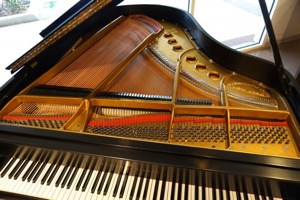 Recently I had my piano tuned (it’s a gorgeous Steinway Model B originally built in 1887, and still going strong! The picture is of a similar, but newer, instrument). After playing it for a while I found that one note was consistently standing out and distracting me each time it sounded. I emailed my tuner, and we corresponded a bit over the nature of the sound. I found myself straining to find words to describe what I was hearing, and I realized that in everyday language, our different senses have very different sizes of vocabularies.
Recently I had my piano tuned (it’s a gorgeous Steinway Model B originally built in 1887, and still going strong! The picture is of a similar, but newer, instrument). After playing it for a while I found that one note was consistently standing out and distracting me each time it sounded. I emailed my tuner, and we corresponded a bit over the nature of the sound. I found myself straining to find words to describe what I was hearing, and I realized that in everyday language, our different senses have very different sizes of vocabularies.
Vision probably has the richest vocabulary, with all kinds of nuances for different colors, shapes, brightnesses, contrasts, and so on. Much of the language is metaphorical, describing “warm” and “cool” colors, for instance.
Taste seems to me to come in second, given the diversity and subtlety we have for describing everything from sweetness or saltiness to texture and what the pros call “mouth feel.”
Hearing and Smell seem to be pretty far behind both of the above. We have pretty limited vocabularies for these. To describe my problematic note, I was using words like “colder” and “limp,” because I just didn’t have anything more precise. Smell seems the same way to me, where we have a few very broad categories, but smaller distinctions are harder to describe.
Finally, we have all the other senses: Touch, Proprioception, Balance, Temperature, and so on. Describing balance, for example, I’m pretty much limited to “I feel fine,” or “I feel woozy,” though maybe “I feel sea-sick” fits in-between. Touch is also impoverished: we don’t have a lot of language to describe the difference between how it feels to have your forearm stroked with a feather versus a piece of cardboard.
Of course, specialists have their own vocabularies. We all know the stories of wine tasters who use bizarre words to compare their drinks, and I’m sure perfumers have a well-developed set of words to articulate the differences they work with every day.
But my point here is that in everyday usage (or at least my everyday usage), these senses have very different sizes of vocabularies. Building on the Sapir-Whorf Hypothesis, this suggests that we can infer the relative importance we assign to each of these senses by comparing their vocabularies. From my linguistically-casual point of view, that seems to make sense to me. But it would be nice to have at least a bit more descriptive power, so I don’t have to tell my piano tuner that the D an octave above middle C is sounding “cold”!
By the way, he came back out and my piano now sounds beautiful.
